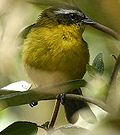Thlypopsis is a genus of birds in the tanager family Thraupidae.
| Thlypopsis | |
|---|---|
 | |
| Rufous-chested tanager (above); and buff-bellied tanager (below); illustration by Joseph Smit, 1886 | |
| Scientific classification | |
| Domain: | Eukaryota |
| Kingdom: | Animalia |
| Phylum: | Chordata |
| Class: | Aves |
| Order: | Passeriformes |
| Family: | Thraupidae |
| Genus: | Thlypopsis Cabanis, 1851 |
| Type species | |
| Nemosia fulvescens[1] = Nemosia sordida Strickland, 1844 | |
| Species | |
|
See text | |
Taxonomy and species list
The genus Thlypopsis was introduced by the German ornithologists Jean Cabanis in 1851.[2] The name combines the Ancient Greek thlupis, a word for an unknown small bird, and opsis meaning "appearance".[3] The type species was subsequently designated as the orange-headed tanager (Thlypopsis sordida).[4][5]
The chestnut-headed tanager was formerly placed in the genus Pyrrhocoma and the superciliaried hemispingus in Hemispingus. A molecular phylogenetic study published in 2014 found that these two species were embedded in Thlypopsis.[6]
The genus contains eight species:[7]
| Image | Scientific name | Common Name | Distribution |
|---|---|---|---|
 | Thlypopsis fulviceps | Fulvous-headed tanager | Venezuelan Coastal Range and far northern Colombia. |
 | Thlypopsis inornata | Buff-bellied tanager | Peru and far southern Ecuador |
 | Thlypopsis sordida | Orange-headed tanager | Argentina, Bolivia, Brazil, Colombia, Ecuador, Paraguay, Peru, and Venezuela. |
 | Thlypopsis pyrrhocoma (formerly assigned to Pyrrhocoma) | Chestnut-headed tanager |
east Paraguay, northeast Argentina, and south Brazil |
 | Thlypopsis ruficeps | Rust-and-yellow tanager | Argentina, Bolivia, and Peru |
 | Thlypopsis superciliaris (formerly assigned to Hemispingus) | Superciliaried hemispingus | Bolivia, Colombia, Ecuador, Peru, and Venezuela |
 | Thlypopsis ornata | Rufous-chested tanager | Ecuador, Peru and southwestern Colombia |
 | Thlypopsis pectoralis | Brown-flanked tanager | Peru |
References
Wikiwand in your browser!
Seamless Wikipedia browsing. On steroids.
Every time you click a link to Wikipedia, Wiktionary or Wikiquote in your browser's search results, it will show the modern Wikiwand interface.
Wikiwand extension is a five stars, simple, with minimum permission required to keep your browsing private, safe and transparent.
